Search Results
Showing results 41 to 60 of 225
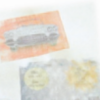
Newspaper Collage
Source Institutions
In this activity on page 3 of the PDF, learners create a collage by using vinegar to transfer color pictures from a newspaper onto a piece of white paper.
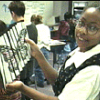
Butterfly Life Cycle Optical Illusion
Source Institutions
This activity is a fun way to show two stages in a Monarch butterfly's life cycle. Learners will create an optical illusion that can be flipped from caterpillar to butterfly.

Playtime Paint
Source Institutions
In this activity on page 9 of the PDF, learners make their own paint using chalk as a pigment and glue and water as binders. This activity introduces learners to special mixtures called suspensions.

Three Circles of Pigments
Source Institutions
In this activity, learners overlap the three primary colors to see how all other colors are made.
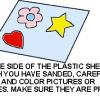
Shrinking Polymers
Source Institutions
In this activity, learners discover that some plastics will shrink when you get them hot. Learners bake polystyrene in a regular oven and discover what happens.
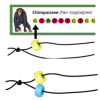
Sequence Bracelets
Source Institutions
In this craft-based activity, learners make DNA sequence bracelets that carry the code of an organism such as a human, trout, chimpanzee or butterfly.
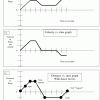
Graph Dance
Source Institutions
In this activity, learners "dance" (move back and forth at varying speeds) by reading a graph. This is a kinesthetic way to help learners interpret and understand how motion is graphed.
Movin' and Groovin'
Source Institutions
In this math activity, learners play a game and identify patterns with fun moves and sounds. Discover how dancing and signing involve patterns.
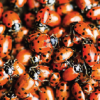
Ladybug Spots
Source Institutions
In this art/science/math activity, young learners are introduced to the concept of symmetry in nature.
Moving Pictures
Source Institutions
In this optics activity, learners create flip books by drawing an image like an eye opening and closing on 24 small pages of paper.
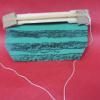
Buzzing Bee
Source Institutions
In this activity, learners explore sound by constructing an instrument toy that buzzes when you swing it.
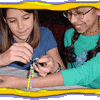
Wear a Chimp on Your Wrist
Source Institutions
Learners construct a bracelet containing two strands of beads, which represents a double strand of DNA that codes for a gene. They match beads to the bases in a section of a chimp's DNA code.
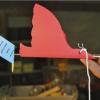
Chirping Bird
Source Institutions
In this activity, learners build a cuica or chirping bird using straw, string, and a bottle cap. Use this activity to explore the interplay of motion and sound.
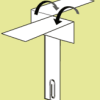
Hang Time
Source Institutions
Learn how to make and fly a paper helicopter! This simple activity includes a template (for the copter "blades") and instructions for folding, flying, and testing designs.
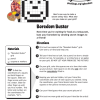
Boredom Buster
Source Institutions
In this Cyberchase activity, use grid coordinates to share secret pictures with a friend. Color squares of a grid to make a picture (like a smiley face) that you keep hidden from the other person.
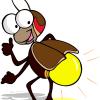
Bug Hats
Source Institutions
In this activity, learners use their imaginations and experiment with different materials to create bug hats.

Thaumatrope Illusion
Source Institutions
Design and create an optical illusion toy that makes two pictures appear to become one. This is called a thaumatrope and will allow the learner to investigate the phenomenon of persistence of vision.

Kool Colors
Source Institutions
Learn about dyes and mordants (fixatives) when you tie-dye fabric with Kool-Aid™ and vinegar. The colored molecules in Kool-Aid™ form a chemical bond between the fiber and dye molecules.

Tie Dye Painting
Source Institutions
This is an activity exploring color and color mixing.
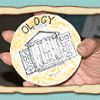
Mint Your Own Coin
Source Institutions
Coins are everyday objects which tell a lot about the people who use them.
